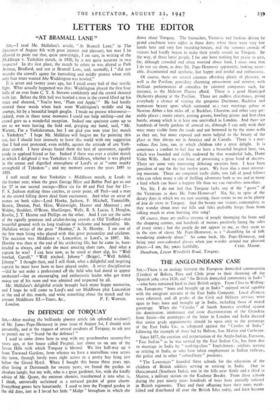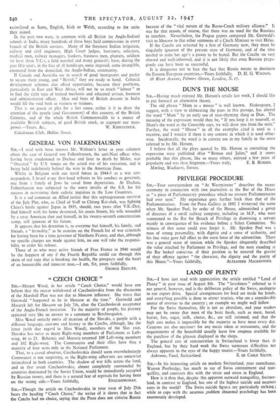THE ANGLO-INDIANS' CASE
Sta,—There is an analogy between the European domiciled communities (Creoles) of Bolivia, Peru and Chile prior to their throwing off the Spanish yoke circa 1820, and " the British domiciled community in India'' —who have remained loyal to their British origin. From Clive to Welling- ton, Europeans " born and brought up in India " enjoyed social equality with the emigrant servants of the East India Company. Local alliances were tolerated, and all grades of the Civil and Military services were open to boys born and brought up in India, including those of mixed parentage. When the " Creoles " of South America revolted against the domination, intolerance and caste discrimination of the Grandees from Spain—the prototypes of the latter in London and India decreed that senior grade appointments should be open only to the patronage of the East India Co., as safeguard against the " Creoles of India " following the example of those led by Bolivar, San Martin and Cochrane.
Since 1857, the creation and perpetuation of the Anglo-Indian, Eurasian, " East Indian" as he was termed by the East Indian Co., has been due to marriage in India by " working-class " Englishmen: soldiers serving or retiring in India, or who have taken employment in Indian railways, the police and in other " subordinate " positions.
"The Lawrences " founded three schools for the education of the children of British soldiers serving or retiring in India. One in Ootacamund (Southern India), one in the hills near Simla and a third in Murree, a military station on the Kashmir Border. From these schools during the past ninety years hundreds of boys have annually enlisted in British regiments. They and their offspring have their roots estab- lished and distributed all over the British Isles today, and have become assimilated as Scots, English, Irish or Welsh, according to the units they joined.
In the past two wars, in common with all British (or Anglo-Indian) schools in India, many hundreds of these boys held commissions in every branch of the British services. Many of the foremost Indian irrigation, railway and civil engineers, High Court judges, barristers, solicitors, medical men, railway managers, bankers, business men, planters, soldiers (at least three V.C.s, a field marshal and many generals) have, during the past fifty years, in the face of all handicaps, some imposed, some intangible, emanated from the domiciled, the Anglo-Indian, community.
If Canada and Australia are in search of good immigrants and prefer to secure them young, and " British," they are ready to hand. Colonial development schemes also afford opportunity, because their problems, particularly in East and West Africa, will not be so much " labour " as to find the right type of trained mechanic and educated artisan, foreman and administration officer. Men and boys of British descent in India would fill the void both as trainers or trainees.
This is no paean or plea for a lost cause, rather is it to draw the attention of the people (and Government) of this country, of the British Colonies, and of the whole British Commonwealth to a source of available British subjects, of good British stock, to augment our man-



































 Previous page
Previous page